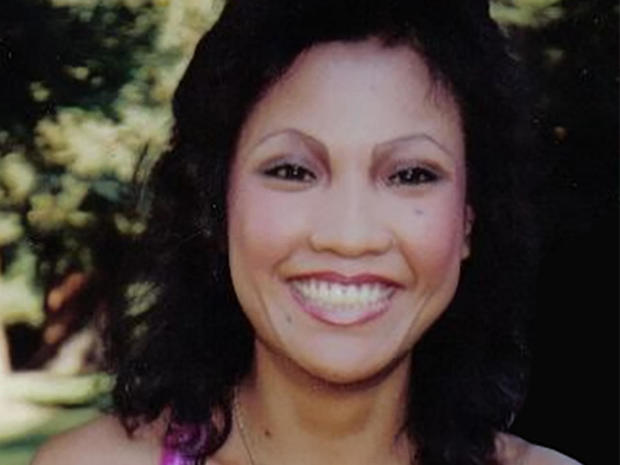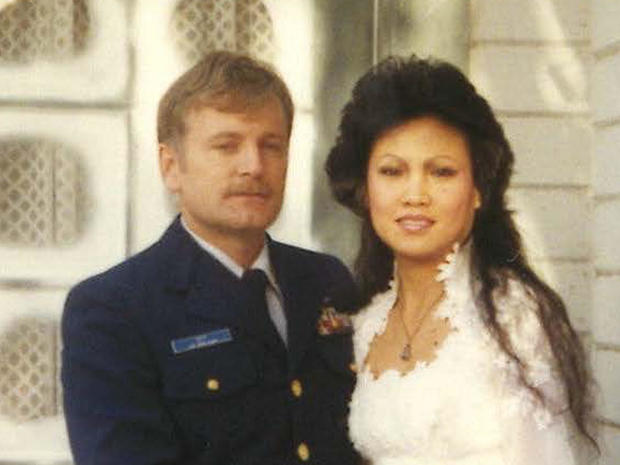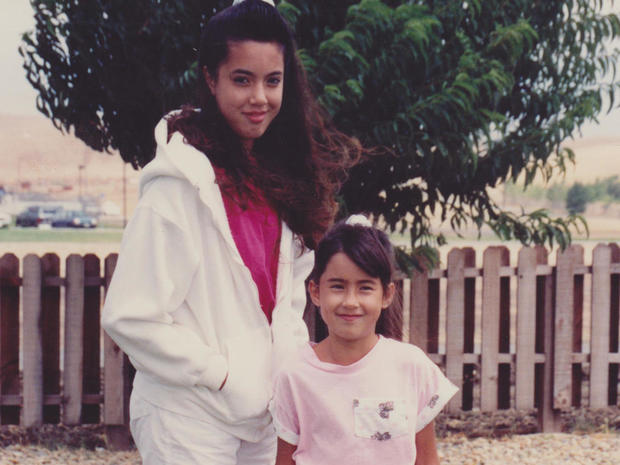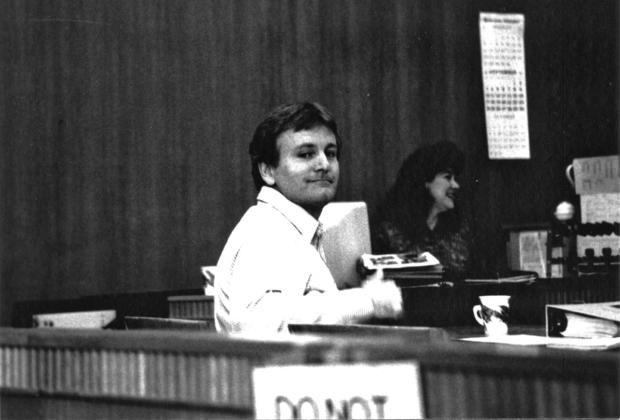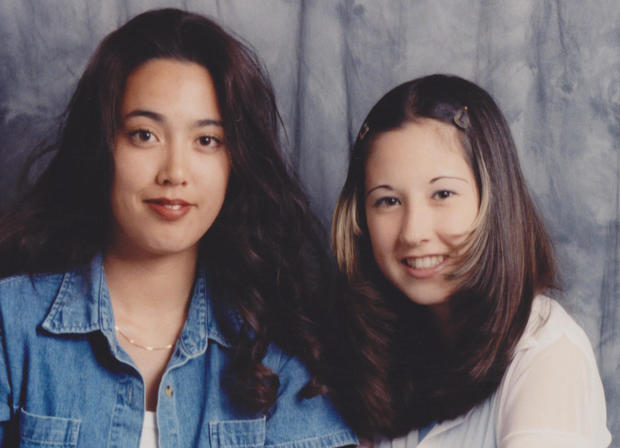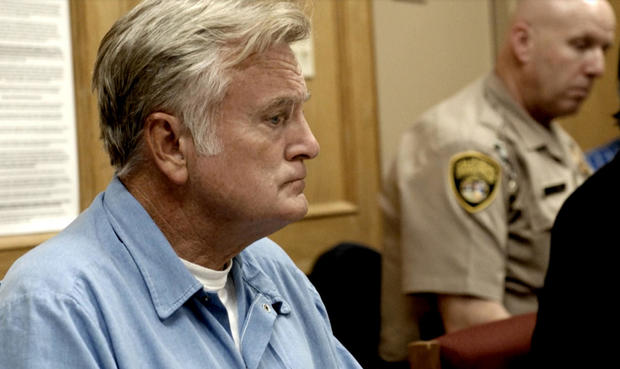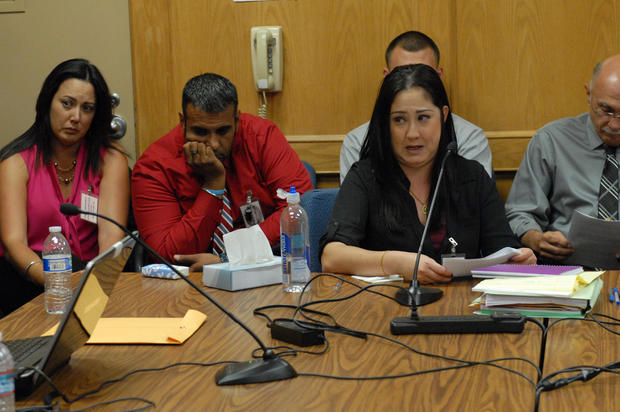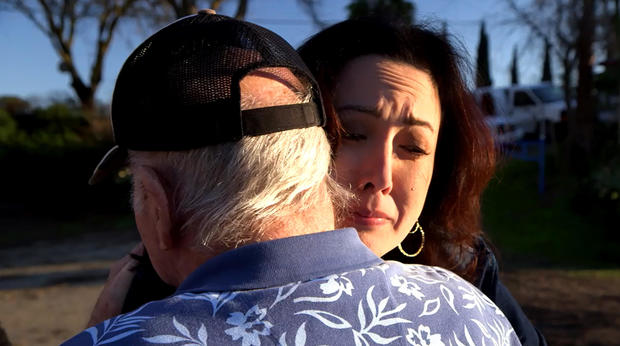Crime & Punishment
Produced by Marcelena Spencer
[This story originally aired on Jan. 7, 2017. It was updated on July 1]
"Our mother was feisty—incredibly vibrant," Jeanette Marine said of her mother, Phonthip Ott.
"She was spunky. She was fun. She was that fun mom," added sister Tippy Dhaliwal.
"Our grandparents picked us up to visit for the day. And when we returned home from the visit and we walked inside and she's not there," said Tippy, who was 14 at the time. Her sister was 10.
"….we weren't even been fully in the house when Tippy, she grabs my hand and she says, 'Something's not right,'" said Jeanette.
"That week that she was missing, I don't remember much. I don't have any recollection of anything up until the day we were told that she was found," said Jeanette.
"I got a nice bite on my fishing pole. I thought I had a fish. But it kept being so heavy that I couldn't bring it in … The way it came to the surface … all I saw was a long black tail," a fisherman explained. "…he bag turned over and I saw two big feet stickin' me in the face and it scared the bejesus out of me…"
"This body was in a large nylon duffle bag about 5 feet tall …it was Phonthip Ott," said Sutter County Sheriff Paul Parker. "And on top of that was large chunks of concrete. …when you go to this much trouble to dispose of a body, this is somebody known to the victim."
If you watch enough crime shows you know the person police usually zero in on when a wife turns up dead is the husband. And this case was no different. Their prime suspect was the victim's husband and stepfather to her two daughters, Dennis Ott.
"There was one fight," Jeanette recalled in tears. "I remember being behind a door. I was so scared. I remember mom screaming for Tippy. 'Tippy help me.' … And I was frozen in fear. … I felt like such a coward hiding behind that door. But I couldn't move."
"Did you think at that time that Dennis could hurt your mom?" Smith asked Jeanette.
"Yes. Yes," she replied.
"We confronted him and he basically said, you know, 'I've got nothing to say to you guys … we took him into custody," the sheriff said of Ott.
"I remember being outside of the courtroom for the trial and … I remember hearing the words, 'He was found guilty' and just sobbing. And there was no stopping it," said Tippy.
And here's where tonight's "48 Hours" is a little different. Correspondent Tracy Smith examines what happens long after the verdict and why two sisters are still fighting for justice nearly 25 years after their mother's murder.
"Why do you think you deserve parole?" Smith asked Ott during a phone call from prison.
"I meet all the criteria for parole … I've been saying for 20 years that I'm not guilty of this crime. …And I've done everything I can in prison to try to justify my release," Ott replied. "I don't believe I'll be a danger to society."
"Our mother doesn't get a second chance," Tippy told Smith in tears. "Why should he?"
"I'm not that child hiding behind that door anymore," Jeanette said. "And I want him to know that I will do everything in my power to keep him incarcerated. Everything."
RED FLAGS
"If you wanna kill somebody and … dispose of the body, you drive up to Sutter County, you dump 'em because we're the first rural open area that they come to outta Sacramento County," said Sheriff Parker.
Sheriff Parker was a young detective in May of 1992, when a fisherman reeled in a weighted duffle bag from the Sacramento River.
"You know, if it wouldn't have been for that fisherman, this would've been an unknown case," the sheriff told Smith.
Phonthip Ott, 33, had been missing for more than a week.
"…and so probably with less than 24 hours I was on surveillance at her house," Sheriff Parker said. "And the reason that we did that so quickly is that this was to us obviously a homicide."
Phonthip, known as Phon, was a hard working immigrant from Thailand with a job at a commercial laundry. She lived with her two daughters, Jeanette and Tippy, in a modest home in Sacramento.
"She's that fun mom. She loved music -- sing along … her little own versions of karaoke," daughter Tippy said. "Frisbee outside, playing with her dogs."
"She was a strong Asian woman who didn't take nothin' from nobody," she continued.
Younger sister Jeanette remembers their mother's laughter.
"Very loud," she said laughing through tears. "Very prideful -- never wanted to ask for help so she did what she needed be done in order to take care of Tippy and I."
Also at home, their mom's new husband, 41-year-old Dennis Ott. He was a Coast Guard Chief Petty Officer and spent months away at sea. He spoke with"48 Hours" by phone from the Solano Prison in California.
"She was a beautiful woman and she was a gentle soul," Ott told Smith. "I still miss her daily."
"But you had nothing to do with her disappearance and death?" Smith asked.
"I had nothing to do with her disappearance and death," said Ott.
"Did you see Dennis as a father figure?" Smith asked the sisters.
"I think I was more welcoming … I think he was charming and a nice guy. I wasn't as hesitant as Tippy was," Jeanette said. "We wanted a complete family or at least I did."
Jeanette and Tippy's grandfather, retired military man Larry Lewis, married Phon's mother. He first met Dennis Ott on Coast Guard Island in Alameda, Calif.
"I think one of the biggest mistakes I made is, 'Well any time you get some free time just stop by the house, you know?'" Lewis said of Ott. "…and then It just happened that when he came over that Phon and the girls were at our house and that's where he met Phon."
"Do you feel guilty?" Smith asked.
"Yeah. I've never said that before," Lewis replied.
"How could you have even imagined?" said Smith.
"You don't imagine. Only a sick person could imagine," said Lewis.
Dennis Ott says the last time he saw his wife was Sunday morning, May 17, 1992.
"I said, 'Do you want to go out do something?' She said, 'No, I have plans.' And she picked up her little black purse and walked out the house. And that was the last I saw of her," said Ott.
Jeanette and Tippy say Ott told their grandparents a very different story.
"When you pulled up, what happened?" Smith asked.
"Dennis was leaving. He was in his car. My grandparents asked if our mom was home and he said, yes, that she was inside and so our grandparents said goodbye to us. …And we got out of the car went inside the house and she wasn't in there," Tippy explained.
And when it came time to file a missing person's report with police, it was their grandpa, Larry Lewis, who filed it – not Phon's husband, Dennis Ott.
"He got really upset … that I'd done it," Lewis said. "Now why would we get upset? Why didn't he file a missing person case?"
Dennis Ott told "48 Hours" he tried to file a missing person's report, but he claims he was told to call the hospitals first. Still, he admits, his marriage to Phon was troubled -- something both her daughters saw early on.
"I started really noticing it before she became missing. There was a lot of fights leading up to that day," said Jeanette.
"And how old were you?" Smith asked.
"Nine or 10, probably," she replied in tears. "And I can hear her screaming right now. It got that bad towards the end."
"Phonthip and I had two altercations … during our marriage. …One was verbal … and the other one was physical where I had just returned home from work," Ott told Smith. "I followed her into our room. And I said, 'What's goin' on?' And she scratched me on the face. And I grabbed her by the hands. …I threw her back on our waterbed and I held her by the arms there so she would stop scratching me."
According to Larry Lewis, Ott could be just as angry when he was away from the family at sea.
"There were letters that he had written while he was at sea that, 'You and Tippy can take a long walk off a short pier,'" said Lewis.
"He had written that to Phon?" Smith asked.
"He had written, yes," Lewis affirmed.
Life with Ott was tense and Phon wanted protection.
"She filed a restraining order saying she was afraid of him. That was about two days before she went missing," said Sheriff Parker.
"That's a huge red flag," Smith noted.
"Yeah, there was red flags popping up all over the place on this," said the sheriff.
Even though the cops were on the case, Phon's family was desperate for answers. Grandpa Larry set out on patrol to try to find out what happened to her.
"Every morning, I would drive to their house. And I would just circle the block, go through the alley just to see if anything -- just anything -- any little thing, but I never did," said Lewis.
But he'll never forget what he observed when he came face-to-face with Dennis Ott shortly after Phon had vanished.
"I saw some marks on his neck. He said he tried to hang himself. But that was rope burn," said Lewis.
"You think he was hauling the body?" Smith asked.
"Oh yeah, yeah, yeah … into the river," Lewis replied.
Detectives found it strange Ott had called the sheriff's office several times about a report in the local newspaper.
"He immediately called us and said, 'I read that you guys recovered a body in the river … weighted down with cement … and, you know, my wife is missing and I wanna know if you've identified this body yet,'" said Sheriff Parker.
"Well, doesn't that sound like a concerned husband?" Smith asked.
"Well, it does sound like a concerned husband, except for I don't know why he would just automatically assume that because we found a body weighted down with cement he would think that was his wife," the sheriff replied.
Parker had a hunch Dennis Ott knew more about what had happened to his wife – a lot more.
SUSPICIOUS EVIDENCE
When their mother, Phon Ott, disappeared, Tippy and Jeanette moved in with their grandparents.
"I remember walking in the house it was dark and everyone was crying," Jeanette recalled.
For nearly two weeks, the sisters had been holding on to hope Phon would be found alive.
"Grandpa took me to the backyard and he just looked at me and he said, 'She's gone. Your mom's not coming home,'" Jeanette cried.
"Do you remember Jeanette's reaction?" Smith asked Lewis.
"Cryin'. Cryin'. Ten-year-old girl. This monster, he done so much damage," Lewis said.
"When her body was found, it was instant," Tippy said. "We knew that he did it. There's no doubt about it."
"You had no doubt?" Smith asked.
"No doubt," Tippy said with conviction.
Smith asked, "Why?"
"Never considered anybody else," she replied. "Don't know how to explain it. It's just somethin' you knew."
After all, it was no secret Dennis Ott's marriage to their mother had hit rock bottom.
"We all knew that they weren't happy. Mom wanted a divorce. Mom wanted a better life for her and for us," said Tippy.
Asked why did she want a divorce, Ott told Smith, "She never said. …I don't know because Phonthip kept secrets."
It seems they both may have kept secrets. Phon suspected her husband was cheating and, she, apparently, had a boyfriend.
"I found these cards that had been written to her the summer before," Ott told Smith. "I said 'Who is this guy?' …I got in her face … I'm kind of ashamed of this, you know, but I was trying to get her to talk and I called her a couple of names that I'm not gonna bother repeating."
"How do you think that looks?" Smith asked Ott.
"Oh, I think it makes it very condemning. It makes it look like I was a very hostile individual," he replied.
Authorities questioned Phon's boyfriend after she went missing and quickly ruled him out as a suspect. They were, however, very anxious to talk to her husband and, as it turns out, he, too, had an important question for detectives.
"He goes, 'Does this have to do with Phonthip?'" Sheriff Parker said. "The detective that was talking to him said, 'Yes, and we need to talk to you today. We need to talk to you right now.' And he says, 'OK. I'll be right there in a few minutes.'"
Ott never showed up, according to Parker. And there was something else the detective was curious about. A few days earlier, he noticed Ott had been spending a lot of time in the backyard. He wanted a closer look and got a search warrant.
"It looked like there was some new fence posts that were erected in the backyard," said Sheriff Parker.
The concrete anchors needed to hold up the fence post were unlike anything Parker had ever seen. They were shaped like an H. And Parker remembered when Phon's body was recovered from the river, it had been weighted down with rocks and chunks of cement in that very distinctive shape.
"I found two or three of these cement, H-shaped anchors lying around in the backyard that were pulled out when he was repairing the fence, that were an exact match for the anchor that was in the bag," the sheriff explained. "…that's when I really started to laserin' down on this guy."
There was something else that puzzled Parker. That white nylon bag that held Phon's body had a patch cut out of it.
"And low and behold, after a long search, with much assistance from Coast Guard Intelligence … we actually found a person that had an identical bag that was available to the Coast Guard," the sheriff explained. "And … where they stamp their lot numbers and I.D. numbers on the bags was the exact spot where this four inch-by-five inch [piece] was cut out. And these were only available to the people in the Coast Guard."
"There's a picture of you holding up one of these bags," Smith mentioned.
"Right, that's it," the sheriff said of the bag. "That's the duplicate that we got from the Coast Guard."
"At the same time, there was nothing to tie Dennis Ott directly to that bag," Smith noted.
"Right, other than, you know, he's in the Coast Guard, he had access to 'em," he replied.
To Parker, the concrete and the bag seemed like significant physical evidence but they were hardly a smoking gun. And while the detective believed he had the right man, the D.A.'s office wasn't convinced there was enough evidence to arrest Dennis Ott for murder.
"They wanted a little bit stronger case," Sheriff Parker said. "They just thought it was a little bit thin."
And the investigation into Phon Ott's murder slowed to a crawl.
"I remember questioning, 'Why he still is going to work, why is he still out and about, why is he still free?'" Tippy said. "Why does Dennis get to live a normal life and our mother's gone?"
"You felt like no one was gonna be held accountable," said Jeanette.
"So about 18 months after your mom was murdered, you decided to do something Tippy?" Smith asked.
"I wrote a letter," she replied. "My grandfather suggested I write letters to the Coast Guard Intelligence, to the D.A."
Tippy read aloud a portion of the letter she wrote when she was just 16:
"Do you honestly think that waiting any longer, you will find more evidence to prove this man, Dennis Ott is guilty? Do you have any idea how hard it is for me and my 11-year-old sister [in tears] to live each day and know that our mother's life was taken? And the man who did it is not in prison."
When Parker read Tippy's letter, he knew he couldn't let this case go cold.
"These things, they rip your heart out, you know, I mean … It just kinda makes you wanna dig in your heels … and we just kinda got in our heads, you know what, 'We're not gonna let this punk get away with this," he said. "We got in front of the grand jury and the grand jury agreed with us … I remember me and another detective went down to Coast Guard Island to pick him up."
"What was that like?" Smith asked.
"He said something along the effect of, 'Well, you can indict a ham sandwich.' And we said, "well, yeah, OK, maybe,' and 'Oh, by the way, here's yours.' And we took him into custody and that was that," Sheriff Parker replied.
In November 1994, Dennis Ott was arrested and charged with his wife, Phon's, murder -- more than two years after her body was recovered from the Sacramento River.
"What were the challenges of this case?" Smith asked Sutter County District Attorney Investigator Vicky Van Natta.
"There was no DNA," she replied.
"Fingerprints?" Smith asked.
"No fingerprints," Van Natta replied.
"Blood evidence?"
"No blood evidence."
"Murder weapon," Smith pressed.
"No weapon," said Van Natta.
It's hard to prove a murder case without a lot of physical evidence. And, when Dennis Ott's defense attorney got a hold of this case, prosecutors were in for a big surprise.
A CASE FOR MURDER
As prosecutors prepared for Dennis Ott's murder trial, Detective Parker was learning more about the relationship between the Coast Guard seaman and his wife.
"This guy's a very controlling person," Parker explained. "If your spouse comes to you and says, 'I don't want you goin' anywhere. And, oh by the way, here, give me your driver's license, I'm tearing it up.' And then takes your car and hides it. … if they feel that you're slipping out of their control, what do they do? I guess some people kill 'em."
With no DNA, no fingerprints, no murder weapon, cops were certain Ott killed his wife, but they weren't sure how he did it.
"We were pretty confident that she didn't crawl in that bag by herself and somehow hop it into the river," Parker noted.
Frank Hartzell had covered a lot of murder cases, but this one was different.
"Back in 1995, I was a reporter for the Appeal Democrat," Hartzell said. "You don't often see a military man on trial for a strange murder like this."
The autopsy report on Phon Ott's body revealed elevated levels of carbon monoxide.
"Initially they believed that she was killed by automobile asphyxiation," Hartzell explained. "And I was very intrigued by that."
Then, a week before the trial, Ott's defense attorney delivered prosecutors a bombshell.
"Our pathologist used some old methods, and they were able to get another pathologist that said his methods weren't correct. So that got thrown out," said Van Natta.
"Then what did they say the cause of death was?" Smith asked.
"Well, we knew she was dead and it looked like possible strangulation," she replied.
"But it was never determined…" said Smith.
"…never determined for sure," said Van Natta.
"How often does that happen? I mean, how often does it happen that the theory of the crime is thrown out just before the trial and the prosecution continues just as if nothing had happened? And now we had no explanation for the cause of death that was definitive," said Hartzell.
"Sometimes you just don't have a cause of death," Sheriff Parker explained. "You know if you get a body in the water after about a week you're gonna start losing evidence of that."
"It's clear what evidence you didn't have. What evidence did you have?" Smith asked Van Natta.
"Well, we had evidence … they got into a fight. He went to her work. He threatened to kill her. He called her all kinds of real bad names," she replied.
"Witnesses who heard him say, 'I'll kill you'? Those words?" Smith asked.
"Yes, and after that. She filed for divorce and he got served divorce papers on the 15th of May," said Van Natta.
The last time Phon was seen alive was two days later, Sunday, May 17, 1992.
"I can't imagine my son murdering anyone. I just don't see it," said Marin Atkinson.
Dennis Ott's mother remembers how Phon's daughter's, Tippy and Jeanette, called her "grandma." In August 1995, she had a front row seat at her son's murder trial.
"Watching Dennis … handcuffed and shackled and everything. I just wanted to scream in agony. It was horrible," Atkinson said.
Prosecutors presented a pile of evidence against Ott, including a wooden fence post from his home and that H-shaped concrete anchor discovered inside the duffle bag. Remember, authorities believed the concrete used to weigh down Phon's body came from Ott's backyard.
"There was concrete found in the bag, but it was not an absolute match, so it was physical evidence, but not like DNA," Hartzell explained.
"Sometimes you make cases on circumstantial evidence," Sheriff Parker said. "And it's just as good as direct evidence or anything else. And especially if you have enough of it."
"One of the things that people said during your trial is, 'Hey, you're from the Coast Guard. The woman's body was found in the water.' Doesn't that seem like something that somebody who's very familiar with the water, has spent his life on the water, would be capable of doing?" Smith asked Ott by phone.
"I've been to the Bering Sea and across the Pacific Ocean and down south of the Equator. To equate the ocean with the Sacramento River is a very, very deep stretch of the imagination," he replied.
Reporter Frank Hartzell also paid close attention to Ott's demeanor in the courtroom.
"I remember him sitting there very stoically, very -- seeming unemotional, unreactive … You're thinking, 'Now why isn't this guy reacting?'" Hartzell said. "And I wondered why we didn't hear more about him and more about his life … maybe he just didn't make a good witness."
"Not everybody is a wonderful witness. But does that make him a killer," Hartzell reasoned.
"You both testified. What do you remember about testifying?" Smith asked Tippy and Jeanette.
"I remember taking the stand and just crying immediately from, 'State your name and spell your name.' …It's a lot to take in for being so young. And to talk about your life and what you remember and little details of putting the investigation together, bits and pieces to help the detectives," Tippy replied, her voice breaking as she continued. "It's very intimidating to sit and stare at the man that did this to your mom."
"I don't recall what exactly was said during my testimony," Jeanette told Smith. "I remember going in the courtroom, sitting down, and looking at a room full of people … I remember him sitting there. But was far as what I said, during trial, I have no recollection of it."
Jeanette may not remember, but what she told the jury was something she had never revealed to anyone in the three years since her mother's murder. On the witness stand, the teary 13-year-old testified she saw Dennis Ott put his hands on her mother's neck during one heated argument.
"How important do you think Jeanette's testimony was at your trial?" Smith asked Ott.
"I think it was extremely important. The emotional impact of a young … girl testifying about a man strangling her mother who's now dead, you gotta be kidding," he replied. "When she broke down and in tears and cried … the emotional impact of that alone."
"Did you ever put your hands on your wife's neck?" Smith asked.
"No, not like that, no. Never," said Ott.
"Do you think that Jeanette was lying?" Smith asked.
"No, I don't think it was a lie as such. I think what it was, was an implanted memory," Ott replied. "Memory, especially for a youngster, can be very malleable.
Ott is convinced Jeanette's testimony sealed his fate. The jury took just three-and-a-half hours to reach a unanimous guilty verdict.
"Did you kill your wife?" Smith asked Ott.
"No, I did not," he replied.
"It felt good to know that 12 other people believed us. They knew what we knew, that he did it. And we didn't need a confession from him to prove that," said Tippy.
Now, more than 20 years after their mother's murder, Tippy and Jeanette would once again come face-to-face with their stepfather, convicted killer Dennis Ott, who desperately wants a second chance at freedom.
THE POSSIBILITY OF PAROLE
On Friday morning, Sept. 25, 2015, more than 20 years after their mother's murder, Tippy Dhaliwal and Jeanette Marine make the 70-mile drive to the place Dennis Ott now calls home: California State Prison Solano, in Vacaville, Calif.
It's a day they have been dreading. The parole hearing for their mother's convicted killer and their stepfather -- Dennis Ott.
"Is it like a trial? Waiting for a jury verdict for you guys?" Smith asked of the hearing.
"Pretty much … you're in a room -- a very small room … you just have to sit feet away from … the man who killed your mother," Tippy said in tears. "It's not somethin' very easily to do."
"You feel—a palpable chill walking into the room," said Ott.
"A chill in the room. I'm trying to imagine. I mean Jeanette and Tippy see you as their mom's killer. What was it like to sit face-to-face with them?" Tracy Smith asked.
"I have so much sadness for those two little girls," Ott said. "The fact that they are looking at me … as the culprit … it's tragic … but still, at the same time, it's something … I have to face."
Video cameras were prohibited at the hearing, but "48 Hours" was granted permission to document it with a still camera.
"Is there a part of you that just wants to lunge across the room?" Smith asked the sisters.
"Every time," Tippy replied. "Alwaytrias, always," said Jeanette.
"How do you control that?" Smith asked.
"You just have to. Me jumping up and going across the table isn't gonna benefit anybody," Tippy replied. "So I think you just have to grin and bear it and hold the bottom of your seat to keep yourself from jumping out of it."
"48 Hours" wasn't allowed to photograph the two commissioners, a man and a woman, who presided over the hearing. Like trial lawyers, they grilled Ott about the crime and his time in prison. It's up to them to decide whether he'll get parole. They are Dennis Ott's judge and jury.
"At its most basic level, our parole hearings in California -- what we look at is who was the person at the time of the crime, who are they today and what's the difference?" said Jennifer Shaffer, the executive director of California's Board of Parole Hearings.
"Has parole been successful in California?" Smith asked.
"Yes, it has been quite successful in California," Shaffer replied.
Asked why, she told Smith, "Because the recidivism rate is so low."
Recidivism is when a person who's served time in jail or prison commits another crime.
"The recidivism rate for people who who've been given parole after – [a hearing, Shaffer interjected] -- being sentenced to life … is what?" Smith asked.
"Less than one percent in California," Shaffer replied. "It's a very difficult process … we have to find that the person no longer poses an unreasonable risk to public safety. …The people that get out are people that have truly changed."
Dennis Ott believes he has changed. And, he says he wants to help other inmates, veterans like him, if he's granted parole.
"When you look at your file … it sounds like you're a model prisoner. Are you?" Smith asked Ott.
"Well, I believe so," he replied. "I've also earned a couple of associate degrees in the last couple of years. … I'm doing everything I can … you know, tryin' to make the best of a bad situation."
"Tippy and Jeanette have said that the only reason you're doing all of these things is to make it look good when you come up in front of that parole commission," Smith commented.
"It's not true," Ott said. "I'm doing what I feel is only the right thing to do."
"And explain to me, how are we supposed to believe that?" Smith asked.
"Well that's something that you're either gonna have to believe or not believe," Ott said. "I mean, I think that actions speak louder than words."
Sutter County District Attorney Amanda Hopper represented Tippy and Jeanette at Ott's parole hearing and prepared them for the possibility he could be released.
"He's over 60 years old now. He's served more than 20 years," Hopper said. "I explained to them that I thought he had a decent chance."
"Do you think that Dennis Ott is a dangerous man? Still?" Smith asked Hopper.
"I absolutely do. I absolutely think he is a danger to society in general and probably to the family," she replied.
Asked what makes her so sure, Hopper said, "Because I sat there and watched him. And I watched the anger in his face. But more importantly, I've seen that he has absolutely no concept of accountability."
And that may be a sticking point at his hearing: Ott has always said he didn't kill his wife. And while inmates don't have to show remorse to get parole, Ott knows it might help.
"You know what, Dennis? … It almost seems like it would be easier, certainly for Jeanette and Tippy, and maybe easier for you, if you just admitted it," said Smith.
"Admit guilt. How interesting. It's not that I haven't thought about that. It would have been actually a whole lot easier a long time ago to say, 'Yeah, I did this crime.' But that's not true," he replied. "I didn't kill Phon. I'm not gonna say I did."
Whatever the parole board decides, they are keenly aware the hearing process can be stressful for everyone in the room.
"When people come to a parole hearing it's because they feel compelled to come. It's not that we mandate that they be there," said Shaffer.
"Is it fair to these victim's families?" Smith asked.
"That's such a loaded question. Do I think it's fair that they have to go through the trauma of parole hearings? No. But … I would not want us to do that process without sitting down and having a live hearing with the inmate," Shaffer replied.
Phon's family listened patiently for more than four hours during Dennis Ott's parole hearing. Then it was Jeanette's turn to speak.
"What did you want the commissioners to understand?" Smith asked.
"That he hasn't changed … that our family is victimized over and over again," Jeanette replied. "I want them to know that even behind bars there is a sense of control that he still holds and has and tries to maintain."
The little girl, who once hid behind a door during that explosive argument between her mother and stepfather, stared him down and didn't hold back.
"He deserves to rot and die in prison plain and simple," Jeanette told Smith. "He took everything from us, everything. And I wanna take everything from him now."
AN EMOTIONAL JOURNEY
While the parole board decides Dennis Ott's fate, Tippy Dhaliwal and Jeanette Marine wait. They have families of their own now and can only imagine what life would be like if their mother's killer is set free.
"I don't want to see him outside of the walls of that prison, which is where he needs to be, where he deserves to be," Jeanette said. "I don't want my children to ever see him, but I'm not scared of him."
"If you had a chance to see him one-on-one," Smith asked, "what would you do?"
"I don't know," Tippy said. "I'm sure there'll be a lot of words exchanged and I'm pretty certain I wouldn't be able to sit in my seat as I am now."
"Look at Tippy and Jeanette, you know?" their grandfather, Larry Lewis said. "This monster took their mother away at the worst possible time in their lives."
"How about you? What are your emotions?" Smith asked Lewis.
"Well, look at my hand right now," Lewis said, his arms crossed and his right hand balled up in a fist. "Angry."
Marin Atkinson is anxious to spend her final years with her son, Dennis, as a free man.
"I'll be 93 in November. And I hope Dennis can come home," she said. "I hope we can have some good years together.'Cause he deserves it."
She knows life is short and tomorrow is not promised.
"I'm living because I want him to get out. I feel like if I become 100 I'll go up there and bang on the door," Atkinson said. "You know, really it doesn't make sense he has to stay in prison."
But, for now, Ott's cell will be his home. After five hours of testimony, the board would take less than one hour to decide he should stay in prison -- parole denied.
"So Dennis, why do you think you didn't get parole?" Smith asked Ott.
"Why didn't I get parole?" … The fact that I do not accept or admit … culpability for this crime," Ott replied. "…they always go back to that."
"The parole commissioners called you 'evasive,'" Smith noted. "Were you being evasive?"
"I don't believe I'm being evasive. I don't think I'm giving 'em the answers they expect to hear," said Ott.
"That moment when you heard, 'Parole denied.' How'd you feel?" Smith asked the sisters.
"You exhale. You get a brief sense of satisfaction," said Jeanette.
"Another small victory," Tippy said, "but we'll be back here again, and hopefully, again."
When the hearing was over, an observer noticed one of the commissioners, the man, seemed teary-eyed.
"These decisions that the parole commissioners are making are life changing, obviously for the inmates … for victims' families. How heavily does that weigh on them?" Smith asked Shaffer.
"It's a very difficult job," she replied. "Reading the crime reports … reading transcripts of criminal trials … it weighs very heavily on them."
In less than two years, Ott gets another chance for parole. His life sentence has become their life sentence too.
"It doesn't end. Never ends for the families. We're victimized over and over again. It's frustrating," said Jeanette.
In the meantime, Jeanette and Tippy are waging their next battle.
"March of 2015, I was diagnosed with stage three lung cancer," Tippy told Smith in tears. "And in June or July … we learned it had spread to my pelvis area and at that point, because it had metastasized, I was bumped up to stage four."
"Do you ask that, 'why me?' My gosh, didn't you suffer enough?" said Smith.
"What more can one person be given in one lifetime?" said Tippy.
"She has to get through it. I can't be without her. She's all I have left," Jeanette said, taking her sister's hand. "And she'll beat it like she always does."
"I love you," Jeanette whispered to her sister. "I love you, too," said Tippy.
When they were young, the sisters often wondered about the fisherman who discovered their mother. And over the years, he wondered about them, too.
"48 Hours" arranged for the three of them to meet.
"My goodness look at the two of you. You don't look anything like I remember. It's a pleasure," the fisherman said as he and the sisters exchanged hugs.
They met for the very first time at a marina on the Sacramento River. It's the place where their mother, Phon, was found.
"My, you've grown up to be some good lookin' chickens," he said as they all laughed.
"…it was right here. It's where we brought your mother in," the fisherman pointed out.
"Where would we be if you had not found her," said Tippy.
"There's no tellin,' darling,'" said the fisherman.
It's a chance to look back with gratitude before starting down the rough road ahead.
"Look at us," Jeanette said. "Twenty years later and it's just as hard today as it was yesterday and the year before that and that day it happened. It doesn't end."

